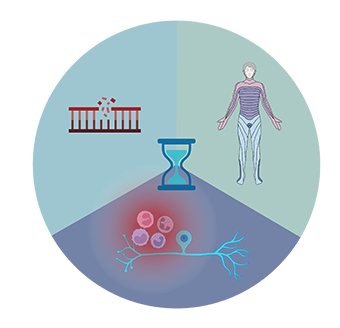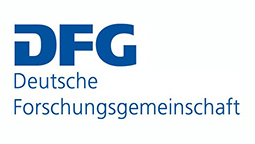
Dr. med. Caroline Perner
Research Group Leader
„Neuro-Immune Interactions“
Department for Hematology, Hemostaseology,
Oncology and Stem Cell Transplantation.
Email: perner.caroline@mh-hannover.de
Phone: +49 1515 99 80 604 / +49 511 532 9737
Research Focus

The scope of the research group focuses on the close communication between peripheral neurons, especially sensory neurons and innate and adaptive immune cells in physiological conditions, in aging and in different diseases ranging from infections to myeloid malignancies.
Dr. Perner and colleagues deciphered the necessity of sensory neuron function in the initiation of type 2 immune responses to allergens where they studied the interface of the neuropeptide Substance P and skin resident innate immune cells (Perner C. et al. Immunity 2020). With this study they added to an arising field of peripheral neuroimmunology, proving that sensory neurons can be necessary for the initiation of immune responses by direct paracrine communication via neuropeptides. Vice versa, recent studies show how sensory neurons are influenced by the release of specific cytokines that shape their activation threshold and with this sensation, perception and the respective functional behaviour in the individuum. The research group “Neuro-Immune-Interactions” is therefore investigating, how immune cells are shaping sensory neuron physiology during aging and which communication axis (chemokines/cytokines) is provoking sensory neuron dysfunction that can lead to symptoms of neurodegeneration and neuropathy.
Funding

Else Kröner-Fresenius Stiftung: Memorial Stipend_2024-2026

DFG Individual Research Grant_PE 2864/5-1_ 2024-2027
Publications
Full publication list and statistics:
https://scholar.google.com/citations?user=pBB2knYAAAAJ&hl=de
10 most important publications:
- Perner C, Flayer CH, Zhu X, Aderhold PA, Dewan ZNA, Voisin T, Camire RB, Chow OA, Chiu IM, Sokol CL. Substance P Release by Sensory Neurons Triggers Dendritic Cell Migration and Initiates the Type-2 Immune Response to Allergens. Immunity. November 17, 2020; PMID: 33098765; 10.1016/j.immuni.2020.10.001
- Voisin T, Perner C, Messou MA, Shiers S, Ualiyeva S, Kanaoka Y, Price TJ, Sokol CL, Bankova LG, Austen KF, Chiu IM, Chiu IM. The CysLT2R receptor mediates leukotriene C4-driven acute and chronic itch. Proc Natl Acad Sci U S A. 2021 Mar 30; 118(13). PMID: 33753496.
- Perner C, Sokol CL. Protocol for dissection and culture of murine dorsal root ganglia neurons to study neuropeptide release. STAR Protoc. 2021 Mar 19; 2(1):100333. PMID: 33615276.
- Perner C, Kruger E. Endoplasmic Reticulum Stress and Its Role in Homeostasis and Immunity of Central and Peripheral Neurons. Front Immunol. 2022;13:859703. Epub 2022/05/17. doi: 10.3389/fimmu.2022.859703. PubMed PMID: 35572517
- Perner C, Perner F, Gaur N, Zimmermann S, Witte OW, Heidel FH, Grosskreutz J, Prell T: Plasma VCAM1 levels correlate with disease severity in Parkinson´s disease. J Neuroinflammation. 16(1):94, 05/2019; PMID: 31068198
- Perner C, Perner F, Stubendorff B, Förster M, Witte OW, Heidel FH, Prell T, Grosskreutz J: Dysregulation of chemokine receptor expression and function in leukocytes from ALS patients. J Neuroinflammation. 15(1), 03/2018; PMID: 29592817
- Ebert C, Perner F, Wolleschak D, Schnöder TM, Fischer T and Heidel FH.: Expression and function of ABC-transporter protein ABCB1 correlates with inhibitory capacity of Ruxolitinib in vitro and in vivo. Hematologica. 101(3), 03/2016; PMID: 26589910
- Perner F, Perner C, Ernst T, Heidel FH. Roles of JAK2 in Aging, Inflammation, Hematopoiesis and Malignant Transformation. Cells. 2019 Aug 08; 8(8). PMID: 31398915.
- DuBreuil DM, Lai X, Zhu K, Chahyadinata G, Perner C, Chiang B, Battenberg A, Sokol C, Wainger B. Phenotypic screen identifies the natural product silymarin as a novel anti-inflammatory analgesic. Mol Pain. 2022 Dec 16:17448069221148351. doi: 10.1177/17448069221148351. PMID: 36526437.
- Perner F, Schnöder TM, Ranjan S, Wolleschak D, Ebert C, Pils MC, Frey S, Polanetzki A, Fahldieck C, Schönborn U, Schraven B, Isermann B, Fischer T and Heidel FH.: Specificity of JAK-kinase inhibition determines impact on human and murine T-cell function. Leukemia. 30(4), 04/2016; PMID: 26242463
Projects
„Immune cell influence on aging of sensory neurons“ - DFG PE 2864/5-1, project number: 532419713
Chronic low-grade sterile inflammation is a hallmark of aging and has been shown to be associated with functional decline and age-related diseases in different organ systems. However, for the vast majority of age associated diseases, we have little understanding of the functional effect of certain immune cell subsets and their context-specificity. This challenge will be addressed by this proposed research, focusing on pathological aging of the peripheral sensory nervous system and associated symptoms of neuropathy including neuropathic itch and pain. The overarching aim is to determine the impact of immune cells on neuronal function during lifetime and identify mechanism of pathologic neuro-immune – interactions that are drivers of sensory neuron aging. This will advance our understanding of disease-associated transcriptional programs underlying sensory neuron aging and answer questions of sensory neuron function that is shaped by immune cell-environment interactions.
„Define immune cell dependent- and independent age-related alterations in sensory neuron physiology.” – Else Kröner-Fresenius Stiftung; Memorialstipendium to Dr. Caroline Perner
Peripheral neurons, which are ubiquitously present in all tissues of the body, communicate with their microenvironment via paracrine messengers. We and others could show, that sensory neurons react directly to stimulants like pathogens or allergens and shape immunity and host defence by releasing neuropeptides. Other studies have reported that neurons in turn are influenced and primed by cytokines, a phenomenon well known through increased pain in locally inflamed tissue.
How this bidirectional communication changes during aging is yet not been addressed. Chronic pain and itch conditions are a main source of decreased quality of life in the elderly population. Peripheral neuropathies effecting proprioception are causing gait instability and increase the risk to fall and with this start a vicious cycle of morbidity and mortality. This project will be the first attempt to characterize and define how excitability and neuropeptide release of sensory neurons is affected by aging.
Team

Dr. med. Caroline Perner
Perner.caroline@mh-hannover.de
Phone: +49 511 532 9737
Dr. Caroline Perner works as a Junior Research Group Leader and physician scientist with affiliations in the Department of Hematology, Hemostasis, Oncology and Stem Cell Transplantation & the Institute for Immunology at the Hannover Medical School. After completing medical school, Dr. Perner graduated (Dr. med) in the Department of hematology at the Otto-von-Guericke University Magdeburg in 2016. Following two years as a clinical fellow in Neurology at the Uniklinikum Jena, she worked as a postdoctoral fellow in the Center for Immunology and Inflammatory Diseases at the Massachusetts General Hospital & the Harvard Medical School (2018-2022). She returned to Germany to continue her clinical training as a Neurologist in 2022 at the Universitätsmedizin Greifswald where she also started working scientifically as a principle investigator. Since 2024 she is working as a Junior Research Group Leader at Hannover Medical School.
Reshmi Suresh, M.Sc.
Reshmi Suresh is a PhD candidate, studying neuropeptide influence on innate immune cells.